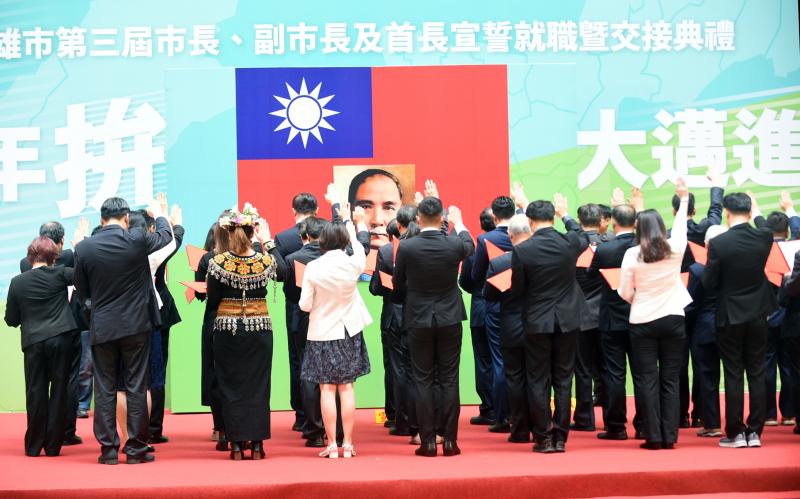Three amendments proposed by Democratic Progressive Party (DPP) lawmakers, which would abolish government tributes to Republic of China (ROC) founder Sun Yat-sen (孫中山), on Friday passed their first reading at the Legislative Yuan, where they are expected to spark controversy among Chinese Nationalist Party (KMT) lawmakers, who have proposed their own amendments.
The DPP amendments to the Presidential and Vice Presidential Oath Act (總統副總統宣誓條例), the Oath Act (宣誓條例) and the National Emblem and National Flag Act (國徽國旗法) are intended to stop the practice of the president, other elected representatives and other officials being sworn into office in front of Sun’s image.
As well, the amendments would no longer require government agencies and schools to have Sun’s image displayed.
Proposed by DPP Legislator Fan Yun (范雲) and other DPP lawmakers, the amendments were introduced after other versions were rejected last month over KMT objections and returned to the legislature’s Procedure Committee.
Fan resent the proposals and they were tackled at the legislature’s plenary session on Friday.
Despite persistent objections from KMT lawmakers, the three proposed amendments passed their first reading, pending reviews at the Judiciary and Organic Laws and Statutes Committee.
Thirty-one KMT lawmakers, led by party Chairman Johnny Chiang (江啟臣), also proposed amendments to the two oath acts, although in a diametrically opposed spirit.
Their proposals would revise the content of oaths of office taken by the vice president, other elected representatives and other officials by adding references to “the ROC” and “the ROC Constitution,” rather than just “the nation” and “the Constitution.”
The presidential oath of office is defined by Article 48 of the Constitution, so is not targeted by the party’s proposals.
The “ROC” is Taiwan’s formal name until a constitutional amendment is passed to change the nation’s name, KMT lawmakers wrote in the proposals.
Highlighting references to the ROC is intended to consolidate the status of the ROC Constitution and prevent those being sworn in from asserting a different stance on national identity, they wrote.
Earlier, Fan said that the KMT proposals clearly target hers.
Fan questioned why KMT lawmakers are wasting time by revising the oaths, as no one would question what “the nation” refers to, but everyone wants to know what the KMT means by “one China,” she said.
Before changing the oaths, KMT lawmakers should use “ROC” in their party’s name, she added.
Source: Taipei Times - 2020/10/25





















